Left: a 2021 photo shows one of the many un-permitted living structures at the Yee Haw community property near Trinidad (screenshot from county presentation). | Right: Property owner Charles Garth addresses the board (screenshot from Tuesday’s meeting).
###
PREVIOUSLY: County Supes Approve Civil Penalities on ‘Yee Haw’ Communal Living Property Near Trinidad
###
For the past quarter-century or so, there have been two wildly divergent perspectives on the communal living property near Trinidad known as “Yee Haw.”
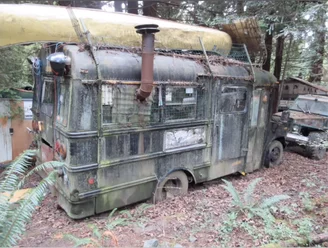
A stovepipe chimney emerges from hog-wire fencing in the window of a modified vehicle on the Yee Haw property. | Photo from county staff presentation.
Many of the dozens if not hundreds of people who’ve lived there — nestled in “hippie-rigged” shacks and tarp-draped old vehicles among the redwoods — see it as a sanctuary, an idyllic “intentional community” where people live close to nature. And they see the free-spirited owner, Charles Garth, as a benevolent figure whose generosity has saved them from homelessness.
But for county employees who work in code enforcement, public and environmental health, Yee Haw represents a long-standing collection of serious hazards to public health and safety, including unsanitary sewage disposal, stockpiles of junk vehicles and detritus, and inhabited structures that don’t meet any building, plumbing, electrical or public safety codes. These officials are more inclined to see Garth as recalcitrant slumlord who has consistently failed to bring his property up to snuff.
Those two divergent perspectives have been a source of conflict since the first “Notice of Nuisance” was served on the property back in May of 2001, and they came crashing together again at today’s meeting of the Humboldt County Board of Supervisors, where county staff laid out a 39-week plan to either coerce Garth into getting his parcel up to code or else proceed with tenant eviction and abatement measures, including environmental cleanup as well as demolition and removal of un-permitted structures.
In a staff presentation, Code Enforcement Manager Dean Beck offered a history of the property, located at 473 Quarry Road, and noted that Humboldt County Superior Court last year upheld $45,000 in civil penalties plus more than $17,000 in administrative costs. A lien on the property was recorded two years ago, and Garth has yet to make a single payment on that debt.
When county inspectors last conducted a full inspection, in 2021, they found that none of the code violations had been remedied. As he showed a series of photos, Beck mentioned unsafe stairways, improperly installed wood stoves, standing barrels presumably filled with human waste, RVs powered by unprotected extension cords and families living in structures that don’t meet minimum safety standards.
Previous code enforcement efforts were delayed or stymied due to court appeals, the death of local attorney Ed Denson (who represented Garth) and efforts to find alternative solutions. But now the county needs to act, Beck said, and staff has proposed a schedule that allows time for an appeal hearing, further legal appeals, tenant relocation, warrants and permits.
“If all goes as outlined, county abatement may begin in June of 2025,” Beck said. He noted that the county previously received a bid for abatement, including removal of structures and disposal of junk vehicles, of more than $306,000, which represents more than 60 percent of his department’s annual abatement fund.
More structures at Yee Haw, as photographed years ago.
Humboldt County Planning and Building Director John Ford said staff has had discussions with Garth about possible remedies, including the potential to qualify this community as an emergency housing village, but no clear solution has been found. And every time staff works on this issue, the administrative costs continue to accumulate.
In the ensuing board discussion, Supervisor Steve Madrone, whose Fifth District includes Yee Haw, expressed sympathy for both Garth and his tenants, noting lack of affordable housing in the larger community and vouching for the efficacy of composting toilets, among other points. And he advocated for continuing to search for alternatives to eviction and code enforcement.
Madrone suggested that Garth’s efforts represent a laudable private-party attempt to address homelessness.
“Are there issues with solid waste, abandoned vehicles and other things? Certainly,” he said. “Are there some conditions that a lot of people would think are substandard? Certainly. But I’ve been in this community of people and on site many, many times — as recently as about four months ago — and I know progress is being made.”
Madrone theorized that Garth, who recently purchased a Trinidad property that includes an old church, might be able to qualify as an operator of an emergency housing village, which, per county code, must be operated by a nonprofit or religious institution. “Becoming a church is not that difficult,” Madrone said.
But Ford pointed out that the structures on the property would still need to meet building and safety codes. He also noted that these latest enforcement efforts were complaint-driven.
Third District Supervisor Mike Wilson was a bit more skeptical of Garth’s good-faith efforts, observing that if he had enough money to buy property in Trinidad he probably could afford to remediate some of the problems at Yee Haw.
“From a public health perspective, our job is to prevent outbreaks, not to wait and respond to an outbreak of something … ,” Wilson said. “Something has to change.”
First District Supervisor and Board Chair Rex Bohn agreed, saying that if the county kicks this matter down the road any farther, then “there is no reason to have a code enforcement or an abatement process.” He later said that while he understands the need to provide housing for those facing homelessness, “I can’t see where anytime there’s going to be a housing shortage that bad where we throw all the environmental and safety and health standards the window.”
During the public comment period, a series of current and former residents of Yee Haw offered passionate defenses of the community and urged the county not to evict them.
“It’s between Yee Haw and the street,” one man said.
“We are solving homelessness, houselessness at Yee Haw,” another man said, “and we have been doing it for 38 years, and we’ve been doing it better than the county, with less money.”
An older woman who lives there described the property as “a really wonderful place” and said she’s “thrilled to be there.”
Another woman said, “I know from outside perspective we look like a bunch of dirty hippies. I have come to absolutely love this community and love my my cabin and my commune [and] my fellow people that I live here.” She said she looks forward to the county’s coming inspection. “I am excited to show you how much we have done and tried to grow as a community.”
Nichole Norris, a former employee of Denson’s who has worked to advocate for Yee Haw residents while also reporting about the issue for Kym Kemp’s Redheaded Blackbelt, said spoke in defense of Garth and the opportunities he gives people who have nowhere else to turn. Specifically she mentioned that it can take a year or more to obtain emergency housing services through the county.
When Garth himself addressed the board he said that the photos of his property that had been displayed were “ancient” and that county staff had misrepresented the history of events. But he said he can definitely work with the county to address issues onsite.
Mario Kalson, the county’s director of environmental health, appeared via Zoom and said that his department does not have any wastewater treatment or septic system permits on file for the Yee Haw property, and he said there are “fundamental problems” with allowing waterless toilets for such a large number of residents at the property, which is zoned agriculture general (AG), meaning no more than two housing units are allowed.
Madrone quibbled with that assessment and again spoke about the merits of composting toilets, and the two went back and forth about the feasibility of them at Yee Haw.
Second District Supervisor Michelle Bushnell thanked the public for their feedback while suggesting that they look to Garth to take responsibility for keeping them from homelessness. Addressing him directly, she added, “To the landowner, please … these folks are really depending on you.”
Wilson said that while he’s sensitive to the fact that this is a class issue — with people who own their homes discussing the fate of people on the verge of homelessness — it’s important to have “equitable enforcement” of health and safety codes.
Bohn said he’s fine with the 39-week schedule that staff has laid out, especially given the two decades-plus that these issues have persisted.
Ultimately, the board voted to accept the staff report, effectively giving a green light to this 39-week plan toward eviction and abatement, though as Ford noted there will be “an opportunity for an off-ramp” from that plan: namely, if Garth pursues a rezone and general plan amendment while making substantial progress toward removing junk vehicles and addressing the code violations.
“But if there’s not progress being made, and if things are not moving ahead, then we will stay on the path to towards removing everything from the site that’s not legal,” Ford said.
Before wrapping up for the day, however, Madrone called Garth back up to the lectern and proceeded to read the list of code violations, asking him to respond “yes” or “no” to the question of whether he’s willing and able to remedy each one. Garth argued a bit about the merits of a few of the items but ultimately said he’ll do what’s necessary.
From the staff presentation: a photo of a pit toilet (right) and a barrel that staff presumes is full of human waste (left).
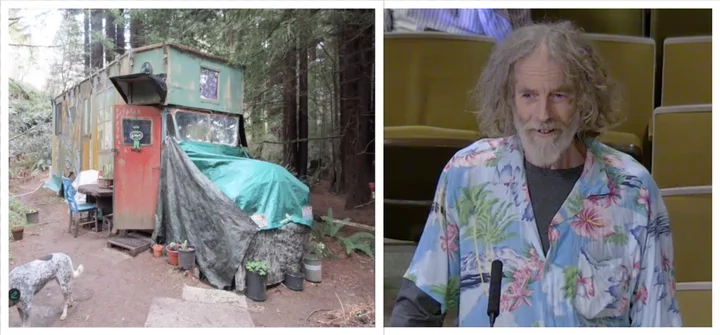
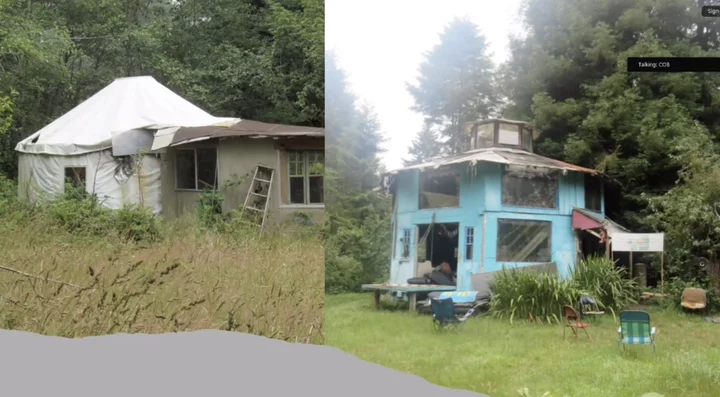
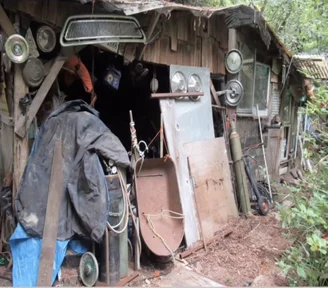
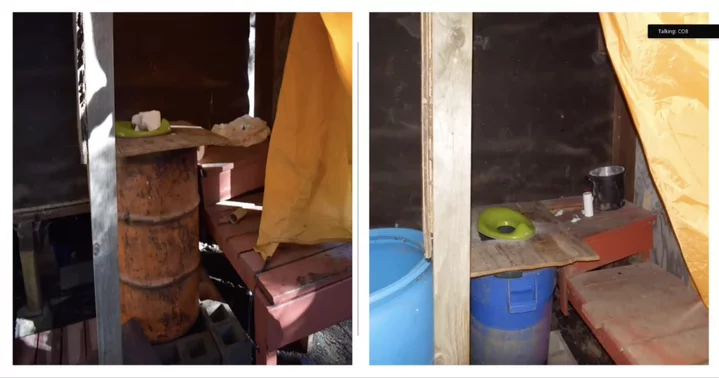
CLICK TO MANAGE